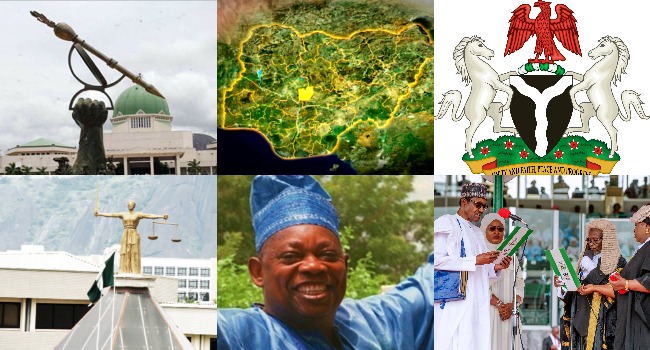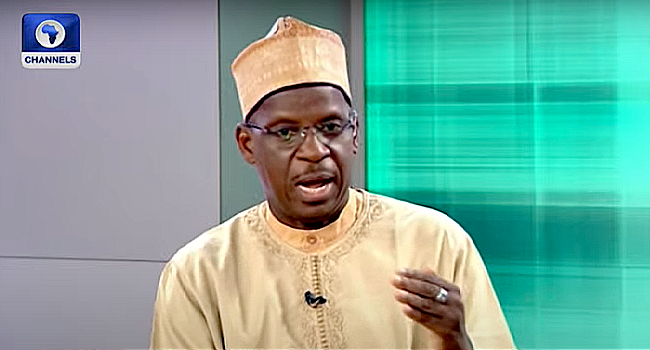Democracy may be as old as the times of the Greeks and Romans, but in Nigeria, democratic rule has only existed for two decades since the military handed power to civilians in 1999.
Though relatively young if compared to that of many other nations, Nigeria’s democratic rule has faced the great tests, witnessing diverse twists and turns, some of which today has led to a change of date for the nation’s Democracy Day, from May 29 to June 12.
Nigeria’s new Democracy Day has a long history, one that has its fair mix of pain and pleasure, a story which tells of a people’s passionate struggle for peace and dogged fight for justice.
Below is a chronological list of events that made up the June 12 struggle and the decision to celebrate Nigeria’s hard-earned democracy every June 12.
We look at Nigeria’s democracy, using the journey of chief MKO Abiola as the frigate.
1980: BEGINNINGS
By 1979, Nigeria’s military government kept its words and handed over to a civilian government, and by 1980 Abiola who was formerly of the National Council of Nigeria and the Cameroons (NCNC), joined the ruling National Party of Nigeria. Though eligible and ready to run for the post of president, Abiola’s hope was (temporarily) dashed when in 1983 a military coup swept away the President Shehu Shagari administration and brought the Second Republic to an end.
1992: FORMATIONS
A coup in 1985 overthrew the military government of 1983, which was led by the then Major General Muhammadu Buhari, bringing into power, General Ibrahim Babangida.
Close to a decade of military rule after, General Babangida came under pressure to return democratic rule to Nigeria.
By 1989, General Babangida legalised the formation of political parties and after a census was carried out in November 1991, the National Electoral Commission (NEC) announced that both legislative elections to a bicameral National Assembly and a Presidential election would be held later in 1992.
By this time two political parties – the National Republican Convention and Social Democratic Party – had been formed to contest in the polls.
Option A4 was adopted as the process of voting.
1993: HISTORIC ELECTION, TRAGIC ANNULMENT
In 1992, rather than hold the Presidential election as scheduled, the General Babangida regime postponed till 1993.
In February 1993, Moshood Kashimawo Olawale Abiola announced his candidacy for President. His party of choice was the SDP. He would run against Bashir Othman Tofa of the NRC.
When the June 12 elections finally held, results from the polls were heavily in favour of Abiola as he secured some 58 percent of the votes.
However, Babangida annulled the election, claiming that although the election was considered free and fair, there were a lot of malpractices.
On August 26, 1993, after succumbing to the crisis and pressure that followed the annulment, General Babangida, handed power over to an interim government headed by Chief Ernest Shonekan.
Barely three months later, on November 17, 1993, General Sani Abacha seized power through a coup, unleashing a rule of terror.
1994: COALITIONS
Abacha’s rise to power was resisted by pro-democracy activists and supporters of the June 12 mandate.
Many of these activists rallied together under the aegis ofthe National Democratic Coalition (NADECO), which was formed on May 15, 1994, by a broad coalition of Nigerian Democrats. NADECO led calls for General Abacha to step down and hand over power to Chief Abiola.
On June 11, 1994, backed by pro-democracy activists and supporters, Abiola declared himself the lawful President of Nigeria in the Epetedo area of Lagos Island. This declaration is what is often referred to as the Epetedo Declaration.
Chief Abiola, was, however, accused of treason, declared wanted and was eventually arrested and jailed on the orders of military president General Sani Abacha.
On November 17, 1994, which was the first anniversary of Abacha’s coup, a bomb exploded in Lagos airport and NADECO warned that it would be a disaster if the nation would only get the international community’s attention with violence.
1995: BOMBINGS AND ARRESTS
On May 19, 1995, Wale Osun, the acting secretary-general of NADECO was arrested. Later in the same month, Chief Cornelius Adebayo and other NADECO members were arrested and interrogated after a bomb explosion in Ilorin, the capital of Kwara State.
1996: ASSASSINATIONS
While NADECO continued to mount pressure on the government of the day and Abiola continued to endure the pains of incarceration, the Nigerian government went after the SDP Presidential candidate’s wife, Kudirat Abiola.
On June 4, 1996, supporters of the June 12 struggle received tragic news. Kudirat who believed and fought relentlessly for the restoration of her husband’s mandate was assassinated brutally murdered; when machine gun-wielding assassins opened fire on her car.
1997: ‘TREASON’ CLAIMS AND TRIALS
On March 12, the military regime charged sixteen pro-democracy activists with treason. They were arraigned before the Chief Magistrate’s Court, Ikeja, Lagos.
They were alleged to have been responsible for a series of bomb blasts in Lagos and other parts of Nigeria, which have appeared to target military personnel and institutions.
Twelve of the accused, Chief Olu Falae, Dr. Frederick Fasehun, Adegbenga Adebusuyi, Moses Akeke Akinnola, Evangelist Bayo Johnson, Adeyemiwo Femi, Oluyinka Festus Adeboye, Layi Odumade, Olugbenga Odumade, Moshood Yahaya, Musa Okoiyaafan, and Sukere Mohammed, appeared in court that day.
The other four accused; Nobel laureate Wole Soyinka, NADECO leader Chief Anthony Enahoro, former Chief of Army Staff Lt. Gen. Alani Akinrinade, and Dr. Amos Akingba, a businessman, were living in exile. They were charged in absentia.
On August 27, 1997, during the first week of Human Rights Watch’s mission to Nigeria, agents of the State Security Service arrested Tunji Abayomi, Chairman of Human Rights Africa (HRA), apparently in order to abort a reception his organization had planned in honor of Justice Elizabeth Kayissyan Pognon, the President of the Constitutional Court of neighboring Benin Republic.
Justice Pognon, the recipient of HRA’s Africa Service Award, was prevented from entering the country. Abayomi was detained for over four days at Shangisha Prison.
Also on August 27, 1997, security agents disrupted a seminar for labour unions organised by the Bureau of African Labour, Human and Democratic Rights, and arrested John Odion, the group’s executive secretary, at the Jabita Intercontinental Hotel, Ikeja, Lagos.
Three days later, armed security agents prevented the launching of a book entitled Abiola, Democracy, and Rule of Law at the Nigerian Union of Journalists Club House in Somolu, Lagos.
In a similar vein, On 21 December 1997, the government arrested top army officials including the Deputy Head of State, Lieutenant General Oladipo Diya, Major General Tunji Olanrewaju, Major General Abdulkarim Adisa, and eight others for allegedly plotting to “violently” overthrow the government of General Sani Abacha.
The eight others included colonels Daniel Akintonde, Edwin Jando, Peters Alinyode, Emmanuel Shode, Major Olusegun Fadipe, and Diya’s political advisor, professor Femi Odekunle.
The reasons for the alleged coup plot are obscure. Although Diya was reportedly known for a “quiet” opposition to Abacha’s presidential aspirations, Olanrewaju and Adisa were regarded “as ultra-loyalists who enthusiastically endorsed an extension of Abacha’s presidential tenure”
1998: SUDDEN DEATHS
By 1st October 1995, Abacha had announced the timetable for a three-year transition to civilian rule. Only five political parties were approved by the regime and voter turnout for local elections in December 1997, was under 10%.
In April 1998, all five political parties adopted General Sani Abacha as their candidate for the August 1 election.
However, Abacha would not live to see the day, as he died unexpectedly of a heart attack on June 8, 1998.
On June 9, 1998,General Abdulsalami Abubakar was sworn in as the 8th military ruler by the Provisional Military Council, he promised to return the nation to civilian rule.
July 7, 1998: A day shy of one month after Abacha’s death and with hopes rising that Chief Moshood Abiola’s mandate will finally be recognised and restored, the nation received heartrending and very controversial news. Chief MKO had died in custody. News of his death triggered riots, especially in Lagos.
Thirteen days later, on 20th of July, 1998, General Abubakar promised to transfer power to civilians on May 29, 1999.
Building upon the military leader’s promise, the Peoples Democratic Party organised itself on the 31st of August.
A draft constitution was released on September 7 and by November 3, Chief Olusegun Obasanjo declared his intention to run for the presidency.
1999 – 2015: BIRTH OF A NEW ERA
In January of 1999, elections to elect governors and legislators for the 36 states took place, by the 28th of January, former finance minister Olu Falaye was selected as flagbearer for the Alliance for Democracy (AD).
Ogbonnaya Onu was chosen by the All Peoples Party (APP) on February 14th, 1999, and by the 15th day of February 1999, Obasanjo won the PDP ticket.
Two days later, on February 17th, 1999, INEC cleared Obasanjo and Falaye for the presidential election.
In May, a new constitution was adopted based on the 1979 constitution and on the 29th, Abubakar transferred power to the winner of the elections, Chief Olusegun Obasanjo.
The nation continued then on to run a 4-year term with the maximum terms being two.
In 2003, Obasanjo won a second term presidential bid and would rule for four more years. He would eventually hand over to another democratically elected leader in the person of Umaru Musa Yar’ Adua who only ruled for two years and died of ill health.
Goodluck Ebele Jonathan who was Vice President at the time would take up the mantle, finish his principal’s remaining two years and win for another four years making a total of six (up until 2011).
Jonathan would attempt again to be President for a second term but his ambition was cut short as he lost to Muhammadu Buhari in 2015.
2018-2019: ‘ATONEMENT’
In 2000, a year after the return to civil rule, Nigeria’s Democracy Day was celebrated for the first time on May 29th, marking the day the country returned to democratic rule.
However, on June 12th, 2018, President Muhammadu Buhari announced a shift in this date from May 29th to June 12th, as from the year 2019 in honour of the June 12 struggle and the heroes of the struggle.
President Buhari had on the June 6th, 2018 announced the posthumous award of the title Grand Commander of the Federal Republic (GCFR), meant only for Presidents.
The late iconic human rights lawyer Gani Fawehinmi (SAN) and Abiola’s running mate in the presidential election, Babagana Kingibe, were also given national honours.
The honours were officially conferred on them on June 12, 1998.
On May 16, 2019, the Senate passed the bill seeking to recognise June 12 as Democracy Day and a public holiday.
On Monday, June 10, 2019, President Buhari signed the Public Holiday (Amendment) Bill into law, officially making June 12 Democracy Day.
June 12, 2019: Nigeria marked Democracy Day for the first time on June 12 and President Buhari proposed the renaming of the Abuja National Stadium as Moshood Abiola National Stadium.





